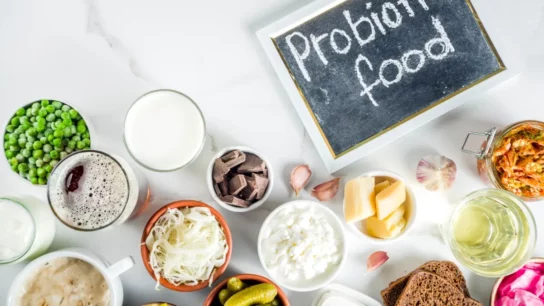Introduction
The gut microbiota, composed of trillions of microorganisms residing in the digestive tract, plays a crucial role in maintaining overall health and well-being. These microbes influence various bodily functions, including digestion, immune function, metabolism, and even mood regulation. In this comprehensive guide, we will explore nine evidence-based strategies to improve your gut bacteria and support optimal gut health.
Eat a Diverse Range of Foods
Consuming a wide variety of foods provides your gut microbiota with diverse nutrients, which helps support a diverse and healthy microbial community. Aim to include a range of fruits, vegetables, whole grains, legumes, nuts, seeds, and fermented foods in your diet to nourish your gut bacteria.
Increase Fiber Intake
Fiber serves as a prebiotic, which means it provides fuel for beneficial gut bacteria. High-fiber foods such as fruits, vegetables, legumes, and whole grains can help promote the growth of beneficial bacteria in the gut and improve digestive health.
Incorporate Fermented Foods
Fermented foods like yogurt, kefir, kimchi, sauerkraut, and kombucha contain probiotics, which are live beneficial bacteria that can colonize the gut and support microbial balance. Including fermented foods in your diet regularly can help maintain a healthy gut microbiota.
Limit Artificial Sweeteners
Artificial sweeteners like aspartame, sucralose, and saccharin have been linked to negative effects on gut bacteria. Studies suggest that these sweeteners may alter the composition and diversity of the gut microbiota, potentially leading to metabolic disturbances and inflammation.
Minimize Antibiotic Use
Antibiotics can disrupt the balance of gut bacteria by killing both harmful and beneficial microbes. While antibiotics are sometimes necessary to treat bacterial infections, it’s essential to use them judiciously and only when prescribed by a healthcare professional.
Manage Stress Levels
Chronic stress can negatively impact gut health by altering the composition and function of the gut microbiota. Practice stress-reducing techniques such as mindfulness meditation, deep breathing exercises, yoga, and spending time in nature to support a healthy gut-brain connection.
Get Regular Exercise
Regular physical activity has been shown to positively influence gut bacteria composition and diversity. Aim for at least 30 minutes of moderate-intensity exercise most days of the week to promote gut health and overall well-being.
Stay Hydrated
Drinking an adequate amount of water is essential for maintaining proper digestion and supporting a healthy gut microbiota. Aim to drink at least eight glasses of water per day, and hydrate with other fluids like herbal tea and broth-based soups.
Avoid Smoking and Excessive Alcohol Consumption
Smoking and excessive alcohol intake have been linked to detrimental effects on gut bacteria composition and function. Quitting smoking and moderating alcohol consumption can help support a healthy gut microbiota and reduce the risk of gastrointestinal diseases.
Frequently Asked Questions (FAQs)
Can I take probiotic supplements to improve my gut bacteria?
While probiotic supplements can be beneficial for some individuals, it’s essential to choose high-quality products with strains that have been scientifically studied for their effects on gut health. Consult with a healthcare professional before starting any supplementation regimen.
How quickly can I expect to see improvements in my gut health?
The timeline for experiencing improvements in gut health varies from person to person and depends on factors such as diet, lifestyle, and pre-existing gut conditions. Consistently implementing gut-friendly habits like those mentioned in this guide can lead to gradual improvements over time.
Are there any specific foods I should avoid for gut health?
While individual responses may vary, some people may find that certain foods like processed foods, sugary snacks, and high-fat foods can negatively impact gut health. Pay attention to how your body responds to different foods and make dietary adjustments as needed.
Can gut health affect mental health and mood?
Yes, emerging research suggests that the gut-brain axis plays a crucial role in regulating mood and mental health. An imbalance in gut bacteria has been linked to conditions like depression, anxiety, and stress. Taking steps to support gut health may help improve mental well-being.
Should I follow a specific diet for gut health, such as the Mediterranean diet or the low FODMAP diet?
Both the Mediterranean diet and the low FODMAP diet have been associated with improvements in gut health for certain individuals. However, there is no one-size-fits-all approach to diet and gut health. Experiment with different dietary patterns and foods to find what works best for you.
Can gut health affect immune function?
Yes, the gut microbiota plays a significant role in regulating immune function and protecting against pathogens. Supporting a healthy gut microbiota through diet and lifestyle habits can help enhance immune function and reduce the risk of infections.
How can I tell if I have a gut health issue?
Symptoms of gut health issues may include digestive discomfort, bloating, gas, irregular bowel movements, food intolerances, and changes in appetite or weight. If you experience persistent or severe symptoms, it’s essential to consult with a healthcare professional for proper evaluation and management.
Conclusion
Improving gut bacteria and supporting gut health is essential for overall well-being and vitality. By incorporating the evidence-based strategies outlined in this guide into your daily routine, you can nurture a healthy and diverse gut microbiota, promote optimal digestion, and enhance your overall health and vitality.
- The Growing Demand For THC Beverages Among Gen Z - May 31, 2025
- Skin Pen Microneedling Near Albury, Surrey - May 31, 2025
- Thc Soda In Illinois IL - May 30, 2025




